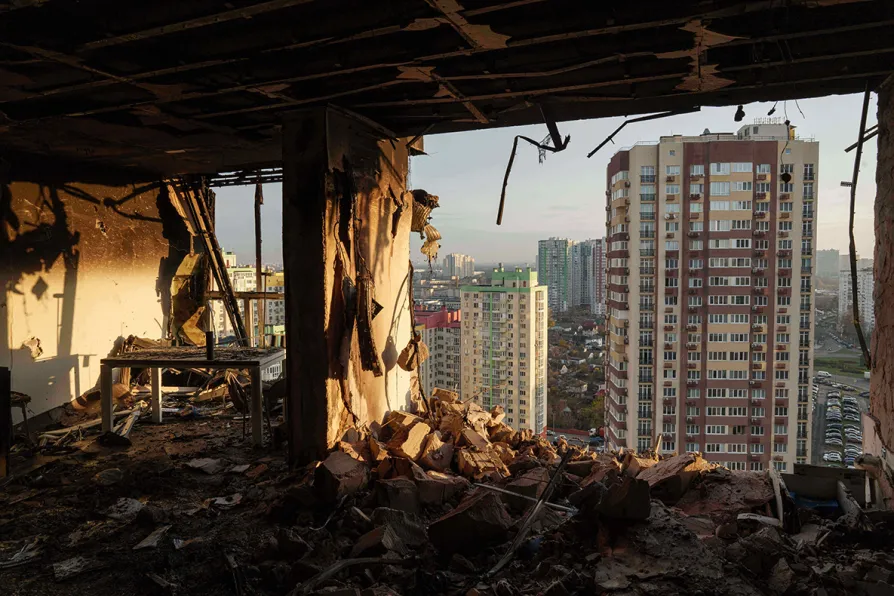Israel’s genocide in Gaza persists, while the war in Ukraine continues with no negotiated settlement in sight. As Europe rearms and Britain expands its nuclear capabilities, CAROL TURNER reviews the alternatives

 A block of flats damaged after a Russian attack on residential neighbourhood in Kyiv, Ukraine, November 14, 2025
A block of flats damaged after a Russian attack on residential neighbourhood in Kyiv, Ukraine, November 14, 2025
FEW would dispute that 2005 has been dominated by conflict abroad and preparations for war at home. Under pressure from President Donald Trump, Europe is preparing to take on a greater share of the military burden and financial cost of the continent’s security.
The Council of Europe is encouraging military integration, promoting Europe-wide procurement, and offering loans for increased military spending. Is rearmament really the way to go?
Britain’s military budget is set rise from the current 2.2 per cent to 2.6 per cent from 2027, with the prospect of reaching 5 per cent within the next decade. As the United States’ chief ally in Europe, Prime Minister Keir Starmer is positioning himself to head of a “coalition of the willing,” ready though far from able to defend Ukraine and take on Russia. In July, Starmer signed the Britain-France Northwood Declaration and the wide-ranging Kensington Treaty with Germany.
The Labour government is increasing war readiness, including expanding Britain’s nuclear capability by accepting the return of nuclear bombs to Britain and purchasing US nuclear-capable fighter jets which will be part of Nato’s European nuclear-sharing arrangements — all without debate, let alone a vote, in Parliament.
With Trump in the White House, the drift to war is beginning to look like a stampede. Alongside these developments, however, anti-war coalitions such as Stop ReArm Europe are coming together. A new generation of peace campaigners is taking to the streets of Britain and protesting at military bases seeking to change the public dialogue.
We represent the interest of the many. Our daunting but indispensable job is to focus public attention on alternatives to war.
Urgent action needed
In Gaza, Palestinians remain under heavy attack from Israel. The West Bank is confronting spiralling attacks by Israeli settlers, supported by the government and backed up by the Israel Defence Forces. The UN reports over 260 attacks in October alone, resulting in Palestinian casualties and property damage — the highest monthly count since monitoring began in 2006.
The Ukraine war — the one Trump claimed he could end in 24 hours — is about to enter its fourth year with no end in sight as Ukrainians prepare for a harsh winter. Yet the prospect of either side opening negotiations seems slim.
President Volodymyr Zelensky’s appeal for US Tomahawk missiles, long-range land-attack armaments capable of reaching Moscow and beyond is a hair-raising escalation the White House has so far resisted. Russian nuclear testing is equally concerning. Reports of a recent 9M730 Burevestnik test, a nuclear-capable intercontinental cruise missile, suggest it flew within reach of the US mainland and Britain. In a foolhardy escalation of nuclear brinksmanship, Trump reminded President Vladimir Putin that US nuclear submarines are deployed “just off your shores.”
Iran, Syria and Yemen merit closer examination. So too does the fragile ceasefire that followed the India-Pakistan clash over Kashmir earlier this year, when a terrorist attack in Indian-administered Kashmir led to a series of escalating military and diplomatic actions between the two nuclear-armed south Asian rivals.
Meanwhile, Venezuela is the latest addition to a growing list of hotspots, and the biggest US military build-up in Latin America for decades. The US military deployment is oriented for a land attack, however, not an anti-drugs operation Trump as claims it to be. It includes a nuclear-powered submarine and the Gerald R Ford aircraft carrier, the world’s largest warship. Concern is growing across Latin America that this will destabilise the region.
Moving forward
The 1967 Treaty of Tlatelolco signed by all 33 Latin American and Caribbean nations has played an important part in maintaining regional stability. Nuclear-weapons-free-zone treaties cover central Asia, Caribbean, the south Pacific, south-east Asia and Africa but are rarely discussed in the West.
CND believes the alternative to war is common security, which prioritises co-operation over conflict and acknowledges the importance of political, economic, social, and environmental justice in a world where the divide between rich and poor continues to grow. This is the security of international treaties which limit arms races and reduce military build-ups — not the “security” of the Nato nuclear alliance dominated by a US president whose idea of negotiation is threats and blackmail.
CND’s in-person annual conference in London on November 22, Stop Nuclear Expansion: Reverse the Government’s War Drive, is a contribution to starting a much-needed debate about alternatives to war. We open with PSC’s Ben Jamal, Ludo De Brabander from the Belgian Peace organisation Vrede, Tricontinental Institute’s Mikaela Nhondo Erskog, and Stand Up to Racism co-convener Sabby Dhalu. They join CND vice-president Jeremy Corbyn to focus on the big issues driving the world closer to war.
Workshops will drill down into some of the detail — including a briefing on Britain’s nuclear expansion and an activist-led discussion about shutting down nuclear bases. Discussion covers European rearmament, the Ukraine war, climate breakdown, the defence jobs myth, militarism in education, and the rise of the far right.
We’re looking at solutions too — building opposition to war and nuclear expansion on the streets, in the unions, and across the universities. Join us and help change the dialogue, register now at https://tinyurl.com/CNDStopWarDrive.
Carol Turner is a CND vice-chair and convener of its international advisory group. She is a long-time peace and anti-war campaigner, and author of Corbyn and Trident: Labour’s Continuing Controversy and Walter Wolfgang: A Political Life.










